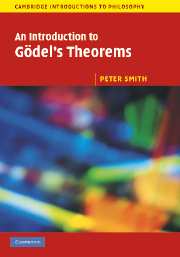Book contents
- Frontmatter
- Contents
- Preface
- 1 What Gödel's Theorems say
- 2 Decidability and enumerability
- 3 Axiomatized formal theories
- 4 Capturing numerical properties
- 5 The truths of arithmetic
- 6 Sufficiently strong arithmetics
- 7 Interlude: Taking stock
- 8 Two formalized arithmetics
- 9 What Q can prove
- 10 First-order Peano Arithmetic
- 11 Primitive recursive functions
- 12 Capturing p.r. functions
- 13 Q is p.r. adequate
- 14 Interlude: A very little about Principia
- 15 The arithmetization of syntax
- 16 PA is incomplete
- 17 Gödel's First Theorem
- 18 Interlude: About the First Theorem
- 19 Strengthening the First Theorem
- 20 The Diagonalization Lemma
- 21 Using the Diagonalization Lemma
- 22 Second-order arithmetics
- 23 Interlude: Incompleteness and Isaacson's conjecture
- 24 Gödel's Second Theorem for PA
- 25 The derivability conditions
- 26 Deriving the derivability conditions
- 27 Reflections
- 28 Interlude: About the Second Theorem
- 29 µ-Recursive functions
- 30 Undecidability and incompleteness
- 31 Turing machines
- 32 Turing machines and recursiveness
- 33 Halting problems
- 34 The Church–Turing Thesis
- 35 Proving the Thesis?
- 36 Looking back
- Further reading
- Bibliography
- Index
5 - The truths of arithmetic
Published online by Cambridge University Press: 05 June 2012
- Frontmatter
- Contents
- Preface
- 1 What Gödel's Theorems say
- 2 Decidability and enumerability
- 3 Axiomatized formal theories
- 4 Capturing numerical properties
- 5 The truths of arithmetic
- 6 Sufficiently strong arithmetics
- 7 Interlude: Taking stock
- 8 Two formalized arithmetics
- 9 What Q can prove
- 10 First-order Peano Arithmetic
- 11 Primitive recursive functions
- 12 Capturing p.r. functions
- 13 Q is p.r. adequate
- 14 Interlude: A very little about Principia
- 15 The arithmetization of syntax
- 16 PA is incomplete
- 17 Gödel's First Theorem
- 18 Interlude: About the First Theorem
- 19 Strengthening the First Theorem
- 20 The Diagonalization Lemma
- 21 Using the Diagonalization Lemma
- 22 Second-order arithmetics
- 23 Interlude: Incompleteness and Isaacson's conjecture
- 24 Gödel's Second Theorem for PA
- 25 The derivability conditions
- 26 Deriving the derivability conditions
- 27 Reflections
- 28 Interlude: About the Second Theorem
- 29 µ-Recursive functions
- 30 Undecidability and incompleteness
- 31 Turing machines
- 32 Turing machines and recursiveness
- 33 Halting problems
- 34 The Church–Turing Thesis
- 35 Proving the Thesis?
- 36 Looking back
- Further reading
- Bibliography
- Index
Summary
In Chapter 3, we proved that the theorems of any properly axiomatized theory – and hence, in particular, the theorems of any properly axiomatized arithmetic – can be effectively enumerated. In this chapter, we prove by contrast that the truths of any sufficiently expressive arithmetic language can't be effectively enumerated (we will explain in just a moment what ‘sufficiently expressive’ means).
Suppose then that T is a properly axiomatized theory with a sufficiently expressive language. Since T is axiomatized, its theorems can be effectively enumerated. Since T's language is sufficiently expressive, the truths of its language can't be effectively enumerated. Hence the theorems and the truths can't be the same: either some T-theorems aren't truths, or some truths aren't T-theorems. Let's concentrate on sound theories whose theorems are all true. Then for any sound axiomatized theory T which is sufficiently expressive, there will be truths which aren't T-theorems. Let ϕ be such an unprovable truth: then ¬ϕ will be false, so that too will be unprovable in our sound theory T. Hence T must be negation incomplete.
So much for the headline news. The rest of this chapter fills in the details.
Sufficiently expressive languages
Recall: a two-place relation R is effectively decidable iff there is an algorithmic procedure that decides whether Rmn, for any given m and n (Section 2.2). And a relation R can be expressed in language L iff there is an open L-wff ϕ such that is true iff Rmn (Section 4.5).
- Type
- Chapter
- Information
- An Introduction to Gödel's Theorems , pp. 37 - 42Publisher: Cambridge University PressPrint publication year: 2007



